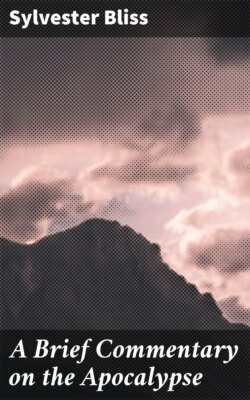Читать книгу A Brief Commentary on the Apocalypse - Sylvester Bliss - Страница 10
На сайте Литреса книга снята с продажи.
Epistle to the Church in Ephesus.
ОглавлениеTable of Contents
“To the messenger of the congregation of Ephesus write: These things saith He who holdeth the seven stars in his right hand, who walketh in the midst of the seven golden lamp-stands: I know thy works, and thy toil, and thy patience, and that thou canst not endure the evil; and thou hast tried those, who say they are apostles, and are not; and hast found them liars; and hast patience, and hast endured on account of my name, and hast not fainted. Nevertheless, I have this against thee, that thou hast left thy first love. Remember therefore whence thou hast fallen, and repent and do the first works; or else I will come to thee quickly, and will remove thy lamp-stand out of its place, except [pg 032] thou repentest. But thou hast this, that thou hatest the deeds of the Nicolaitanes, which I also hate. He, who hath an ear, let him hear what the Spirit saith to the congregations: To him, who overcometh, I will grant to eat of the tree of life, which is in the paradise of God.”—Rev. 2:1–7.
The seven churches are not, themselves, seen in vision; they were symbolized by seven golden candlesticks. Consequently, these are seven literal churches that are addressed, and not allegorical, as some teach. The symbolic portions of the Apocalypse, are the descriptions of what John saw, and the attendant utterances. What was addressed to the ear by way of explanation and instruction, does not come under the laws of symbolization.
As churches, in all ages, are often in the several conditions ascribed to the seven churches, the warnings, admonitions, and consolations addressed to them, may serve for instruction to all Christians, as implied in the declaration: “He that hath an ear, let him hear what the Spirit saith to the churches,” 2:29.
“By αγγελος, angel [or messenger], we are to understand the messenger, or person sent by God to preside over the church; and to him the epistle is directed, not as pointing out his state, but the state of the church under his care. The Angel of the Church, here answers exactly to that officer of the synagogue among the Jews, called the messenger of the church, whose business it was to read, pray, and teach in the synagogue.”—Dr. Clarke. Timothy is [pg 033] supposed to have had the care of the Ephesian church till AD 97, when he was martyred.
Ephesus was a large, idolatrous city, “a worshipper of the great goddess Diana, and of the image which,” as they claimed, “fell down from Jupiter,” Acts 19:35. The gospel was first preached there by Paul, and with such success, that “Many of them also which used curious arts, brought their books together, and burned them before all men; and they counted the price of them, and found it fifty thousand pieces of silver: So mightily grew the word of God, and prevailed,” Ib. 19, 20. They continued a fine and prosperous church, but had fallen away from their first love. Therefore He who walketh in the midst of the seven golden candlesticks, and holdeth in his hand the messengers of the churches, admonished them that, unless they repented he would remove their candlestick, i.e., their church, of which the candlestick was a symbol, out of its place. They did not repent; and, says Gibbon, “In the year 1312, began the captivity, or ruin of the seven churches by the Ottoman power. In the loss of Ephesus, the Christians deplored the loss of the first Angel, the extinction of the first candlestick of the Revelations. The desolation is complete, and the temple of Diana, or the church of Mary, will equally elude the search of the curious traveller.”
The Nicolaitanes, whose deeds God hated, were a sect of heretics, who assumed the name [pg 034] from Nicholas of Antioch, one of the first seven deacons of the church in Jerusalem. It is believed that he was rather the innocent occasion, than the author of the infamous practices of those who assumed his name—who allowed a community of wives, and ate meats offered in sacrifice to idols. It was a short-lived sect.
For hating their deeds, the church of Ephesus was commended, and also for not giving countenance to false teachers, who claimed to be apostles, and were proved to be liars. Thus are Christians to “believe not every spirit, but try the spirits whether they are of God: because many false prophets are gone out into the world,” 1 John 4:1. “Such are false apostles, deceitful workers, transforming themselves into the apostles of Christ,” 2 Cor. 11:13. “There were false prophets also among the people, even as there shall be false teachers among you, who privily shall bring in damnable heresies,” 2 Pet. 2:1.
The promise to him that overcometh, that he shall “eat of the tree of life,” points to the resurrection and to the new creation. As in Eden was made to grow “the tree of life” (Gen. 2:9), so in Eden restored, “they that do his commandments … may have right to the tree of life, and may enter in through the gates into the city,” Rev. 22:2.
[pg 035]
